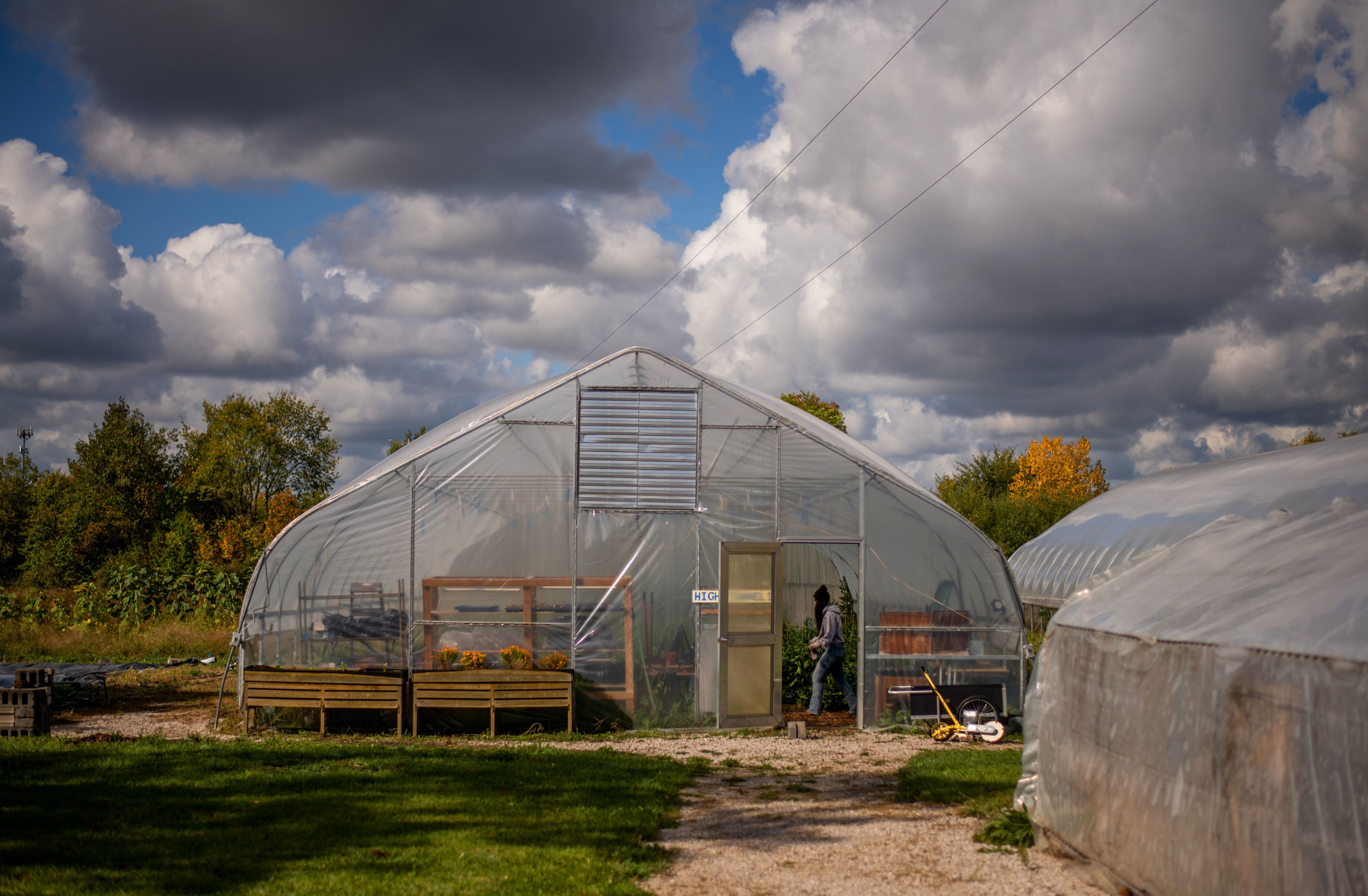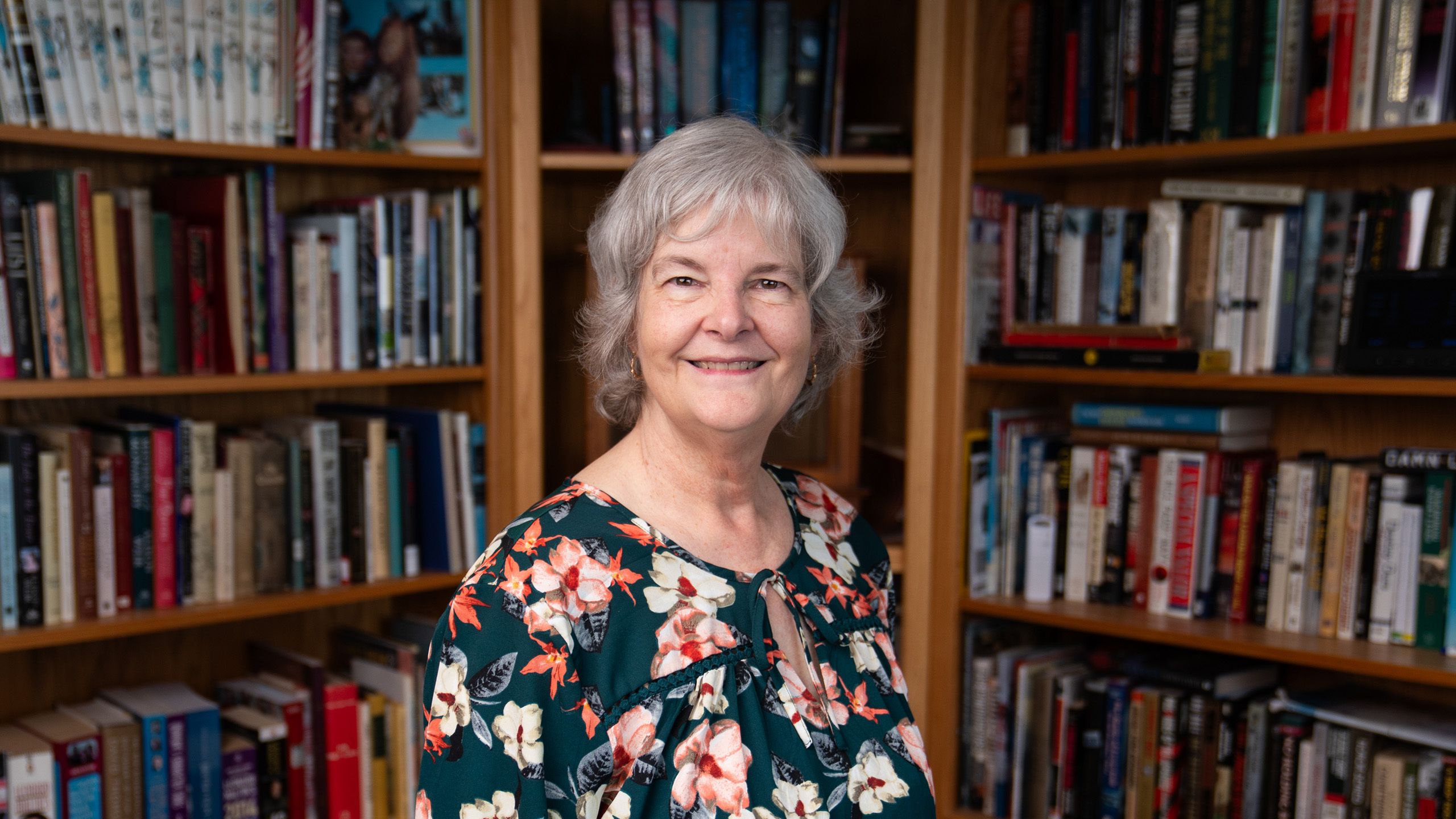Vietnam
Four decades later,
refugee leads
students to her
homeland

STORY BY MICHELE COFFILL
PHOTO OF CONNIE BY AMANDA PITTS
Even four decades later, Connie Dang’s face showed a lot of emotions and her voice cracked at times as she retold the story of the day in 1979 when she and her family fled their home in Vietnam.
She was 15. Dang, who recently retired as Grand Valley’s senior inclusion and equity officer, said she arrived home from school with her sister that day. Walking together to and from school was a ritual for the Pham sisters. Once home, her father announced the family was going out to dinner. They piled into the car and drove. They drove for a long, long time, said Dang.
“Finally, we arrived at a fisherman’s village and we were told to get on the boat,” she said. “We paid money to this fisherman to get us out of Vietnam. There were about 120 people crammed on this 50-foot boat.
“For 10 days, we traveled on this fisherman’s boat to Indonesia.”
The Vietnam War ended in 1975 but political unrest, a failing economy and raging wars in Cambodia and China forced a refugee crisis in that country that would grow to more than 2.5 million people.
“I had no idea my family was fleeing Vietnam that day. My parents later shared that we had to keep it a secret, otherwise, we could have been persecuted if anyone found out,” Dang said.
It took more than 40 years for Dang to return to Vietnam. There had been opportunities to travel with her parents and relatives. She did not attend the funerals of her grandparents. “I’ve been holding this guilt, these feelings of betrayal for fleeing my country and leaving my friends and relatives behind,” Dang said.
She did not return until she found a purpose.
Last June, Dang and Scott Stabler, professor of history, led 10 students in the inaugural, faculty-led study abroad program to Vietnam. The two-week trip had stops in nine cities, starting in the north at Ha Noi and traveling south to Ho Chi Minh City.
“I didn’t want to go back as a tourist. Some in Vietnam call me and others in my position ‘foreigners,’” she said. “But leading a cohort of students on this global experiential learning program gave me a purpose, a very meaningful purpose.”

Connie and her father pictured on Lunar New Year in Vietnam.
Connie and her father pictured on Lunar New Year in Vietnam.

The Phams in 1970: Tham and Lien with children (left to right) Hung, Connie, Chuc and Loc.
The Phams in 1970: Tham and Lien with children (left to right) Hung, Connie, Chuc and Loc.
‘Little sister’ tours Vietnam
Students who participated in the program began two classes before traveling to Vietnam. Dang taught a Vietnamese history, culture and people class; Stabler led students through a history of the Vietnam War.
“It was crazy to think that the students we traveled with were older than the average age of a Vietnam War soldier, which was 19,” Stabler said.
Celia McClure-Sikkema, a junior from Grand Rapids, said they were thrilled to be among the first students to participate in a faculty-led program to Vietnam, partly because they have relatives who live in Laos and Vietnam.
“I understood different pieces of Southeast Asian culture because of my family,” McClure-Sikkema said. “I knew the war was horrible, but I only had that American perspective. Being there was a big eye-opener because I was getting the experience of the Vietnamese people.”
As a social work major, McClure-Sikkema said they immediately noticed the emphasis the Vietnamese placed on family.
“People in restaurants would call me ‘little sister,’ rather than ‘ma’am,’ which I thought was very human-centered. That was big for me,” they said.
“We talk about creating
a sense of belonging for
our students at Grand Valley.
Back in 2022, I thought to
myself, ‘Where do we belong?’”
Connie Dang,
retired senior inclusion
and equity officer


In West Michigan: ‘Surviving’
That fisherman’s boat with 120 people made its way to Indonesia. Dang recalled terrible thunderstorms at sea that would “make this open-air boat seem like a roller coaster.”
The travelers were taken to a refugee camp to wait for an American sponsor. After five months, St. Pius X Catholic Church in Grandville welcomed Dang and her family and set them up in a house in that West Michigan city.
As new refugees who spoke little English, Dang called the act of going to an American school with her sister “surviving.”
“I was in the 10th grade at Grandville High School and communicating primarily through the school’s French teacher,” she said.
Her parents learned English at a community center in Wyoming. Soon, Dang’s father got a job at Steelcase Inc. in the maintenance department.
“It was really a time of survival for all of us. But going to college and obtaining a degree was an expectation and a goal established for all of us; my parents believed education presented opportunities for social and economic mobility,” she said. “After school, I would help my mom with my four younger siblings until they went to bed. For me, homework meant working with an English-Vietnamese dictionary. I would usually finish by 1 a.m.”

Connie and Julia Dang visited Vietnam in 2022. Pictured is an altar at Connie’s uncle’s house, where they paid respect to Connie’s grandparents by praying and lighting incense.
Connie and Julia Dang visited Vietnam in 2022. Pictured is an altar at Connie’s uncle’s house, where they paid respect to Connie’s grandparents by praying and lighting incense.
Stories matter
In West Michigan, there are more Vietnamese immigrants and people of Vietnamese descent than any other Asian country. Dang said that was partly why she wanted to help develop this program. “This is our community. We must equip our students with the cultural competency and knowledge to live and work with people from diverse backgrounds,” she said.
Planning the 2023 trip began with a site visit the year before. Dang and Stabler scouted cities and landmarks to ensure the inaugural trip would be safe, affordable and accessible for students. They also began to collaborate on the classes they would teach. For Dang, that meant a syllabus grounded in the narrative approach.
“The book I selected was a collection of short stories. Narrative research allows for the study of the richness of individual experiences in the context of their historical and cultural background,” she said.
Dang paired narrative research with counter-storytelling, a method she said offers space for people whose experiences and perspectives are often delegitimized to tell their story and to challenge ongoing stereotypes.
Celia McClure-Sikkema said they returned home from Vietnam with a global perspective that will propel them forward as they finish a social work degree and move into the workforce.
They credited Dang for her tour guide’s insight and for leading the class on Vietnamese culture.
“I do have a better understanding of the country now. After the war, it was decimated but the country built itself back up using a strengths-based approach,” McClure-Sikkema said. “I saw a level of vulnerability in the people.”
McClure-Sikkema noticed a lot of Vietnamese flags flying from homes and businesses during their trip. What was not so tangible, they said, was the noticeable level of pride people had in their country.
“We talk about creating a sense of belonging for our students at Grand Valley. Back in 2022, I thought to myself, ‘Where do we belong?’”
Connie Dang, retired senior inclusion and equity officer
In West Michigan: ‘Surviving’
That fisherman’s boat with 120 people made its way to Indonesia. Dang recalled terrible thunderstorms at sea that would “make this open-air boat seem like a roller coaster.”
The travelers were taken to a refugee camp to wait for an American sponsor. After five months, St. Pius X Catholic Church in Grandville welcomed Dang and her family and set them up in a house in that West Michigan city.
As new refugees who spoke little English, Dang called the act of going to an American school with her sister “surviving.”
“I was in the 10th grade at Grandville High School and communicating primarily through the school’s French teacher,” she said.
Her parents learned English at a community center in Wyoming. Soon, Dang’s father got a job at Steelcase Inc. in the maintenance department.
“It was really a time of survival for all of us. But going to college and obtaining a degree was an expectation and a goal established for all of us; my parents believed education presented opportunities for social and economic mobility,” she said. “After school, I would help my mom with my four younger siblings until they went to bed. For me, homework meant working with an English-Vietnamese dictionary. I would usually finish by 1 a.m.”

Connie and Julia Dang visited Vietnam in 2022. Pictured is an altar at Connie’s uncle’s house, where they paid respect to Connie’s grandparents by praying and lighting incense.
Connie and Julia Dang visited Vietnam in 2022. Pictured is an altar at Connie’s uncle’s house, where they paid respect to Connie’s grandparents by praying and lighting incense.
Stories matter
In West Michigan, there are more Vietnamese immigrants and people of Vietnamese descent than any other Asian country. Dang said that was partly why she wanted to help develop this program. “This is our community. We must equip our students with the cultural competency and knowledge to live and work with people from diverse backgrounds,” she said.
Planning the 2023 trip began with a site visit the year before. Dang and Stabler scouted cities and landmarks to ensure the inaugural trip would be safe, affordable and accessible for students. They also began to collaborate on the classes they would teach. For Dang, that meant a syllabus grounded in the narrative approach.
“The book I selected was a collection of short stories. Narrative research allows for the study of the richness of individual experiences in the context of their historical and cultural background,” she said.
Dang paired narrative research with counter-storytelling, a method she said offers space for people whose experiences and perspectives are often delegitimized to tell their story and to challenge ongoing stereotypes.
Celia McClure-Sikkema said they returned home from Vietnam with a global perspective that will propel them forward as they finish a social work degree and move into the workforce.
They credited Dang for her tour guide’s insight and for leading the class on Vietnamese culture.
“I do have a better understanding of the country now. After the war, it was decimated but the country built itself back up using a strengths-based approach,” McClure-Sikkema said. “I saw a level of vulnerability in the people.”
McClure-Sikkema noticed a lot of Vietnamese flags flying from homes and businesses during their trip. What was not so tangible, they said, was the noticeable level of pride people had in their country.
Study Abroad Trip to Vietnam
The two-week trip had stops throughout Vietnam, starting in the north at Ha Noi and traveling south to Ho Chi Minh City.






Study Abroad Trip to Vietnam
The two-week trip had stops throughout Vietnam, starting in the north at Ha Noi and traveling south to Ho Chi Minh City.






‘Where do we belong?’
Dang earned a bachelor of business administration degree from Western Michigan University, a master of public administration degree from Grand Valley and a doctorate in educational leadership from Eastern Michigan University.
Her siblings, now spread between Michigan and Texas, are equally as accomplished. Among their combined professions are two engineers, a teacher and an intensive care nurse.
“All of us have worked hard and we are successful. We strived hard to pursue the goal that our parents established for us,” she said.
Her parents used to watch Dang’s children, Alex and Julia, when they were younger and Dang went to work at Grand Valley, initially in the Human Resources office. It was Tham and Lien Pham who taught their grandchildren Vietnamese words and phrases, and the country’s traditions.
Julia Dang, now 26, traveled with her mother to Vietnam during the 2022 site visit. The stories Julia had heard her entire life unfolded before her eyes, Connie Dang said.
“I took Julia to the village where my grandparents were born and buried. When they died, I didn’t have the opportunity to put them to rest. We stood at the altar of my grandparents, lit incense and said prayers.
“There were no words to describe that feeling,” Dang said.
Connie Dang’s father, Tham Pham, died in 2017. Dang and her brother, Hung Pham, started a scholarship at Grand Valley to honor him. The Pham Dinh Tham Memorial Endowed Scholarship assists Vietnamese students with the cost of their education. Her mother is now 83.
“I’ve been holding this guilt, these feelings of betrayal for fleeing my country and leaving my friends and relatives behind.”
Connie Dang, retired senior inclusion and equity officer
“Taking my daughter to her motherland brought to life the stories she has heard and read,” Dang said. “I am a refugee because of the war but I never thought Julia was impacted by the war until I watched her in Vietnam.
“We talk about creating a sense of belonging for our students at Grand Valley. Back in 2022, I thought to myself, ‘Where do we belong?’”
Before the study abroad trip, and before her site visit with Stabler in 2022, Dang read and re-read stories about the Vietnamese, both to plan for the upcoming class and to better understand the people who rebuilt their country after the war. That preparation steadied Dang for what to expect when the plane landed.
“I was grateful to go back in 2022. It helped me sort through those feelings that were oppressed,” she said. “Every site we visited had a connection to the classroom, and we made connections with our readings throughout the whole country, north to central to south.
“I was also able to reconcile feelings of guilt and betrayal and make peace with myself.”







